FOUR NOT-YET-RELEASED FORTHCOMING TITLES. PRE-ORDER NOW.
Of course, we can take pre-orders for anything forthcoming, anytime, so don’t hesitate to let us know what you want and we’ll set you up. For now, here are four that are soon to be released that we are very eager to promote a bit early. Let us know how we can help.
Scroll down to the bottom of the post to find the order links. Thanks.
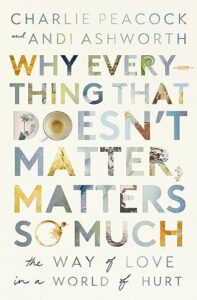 Why Everything That Doesn’t Matter, Matters So Much: The Way of Love in a World of Hurt Charlie Peacock & Andi Ashworth (Thomas Nelson) $19.99 OUR SALE PRICE = $15.99 NOT YET RELEASED / PRE-ORDER – releasing March 12, 2024
Why Everything That Doesn’t Matter, Matters So Much: The Way of Love in a World of Hurt Charlie Peacock & Andi Ashworth (Thomas Nelson) $19.99 OUR SALE PRICE = $15.99 NOT YET RELEASED / PRE-ORDER – releasing March 12, 2024
In other words, folks, this is coming out in less than a week! We are so jazzed about this — it has been years since Charlie or Andi have released new books and they are both remarkable thinkers, creatives and organizers, networking folks to create culture, to make beauty, to do good work. They have a great passion which they have stewarded for decades about helping to heal the woundedness of the world, the world God so loves but is in need of repair. This book with an allusive title tells some of that story.
You may know Charlie as a former hippy bohemian who became a Christian in the early 70s, I gather, and made a huge mark in the edgier sounds of the fringes of contemporary Christian music in the 80s. (He was in new wave band Vector, as I recall, produced the 77s, mentored Switchfoot in their earliest days, and started a cool, alt-CCM label that released the work of Sarah Masen — partner of David Dark, in fact.) He wrote a book decades ago about the problem of sequestering faith-informed music into its own sub-culture and safe silos (even though he reluctantly played a role in that, trying to bear witness to goodness and artfulness from the inside, even producing the likes of CCM icon Amy Grant.) In recent years he returned to jazz and has won all sorts of awards for producing some fairly important indie rock and mainstream bands. He has worked with the One Campaign with his friend Bono. He is, as you can imagine, a hero to many of us and a decent and intelligent Christian.
Andi, too. She has effectively served as a colleague and partner to many of Charlie’s wildest dreams —not least of which was their founding of and directing Art House in a few US cities, a place and space to encourage young artists and musicians, bringing in folks like Steve Garber to nourish a integrated vision of vocation among the makers. She has been a writer and thinker and behind-the-scenes care-giver for years and her work has been tireless and kind. She wrote one of our favorite little books ever, the remarkable volume on home-making called Real Love for Real Life: The Art and Work of Caring which was picked up and re-issued years ago by the lovely folks at Rabbit Room.
Here, from what I gather (I haven’t seen one yet) this is their manifesto about living a life of passion, conviction, holy worldliness, if you will, living out of a faith where everything matters. Or maybe none if it matters that much, if not done in love. I am sure there will be plenty of energizing wisdom about culture-making and the like, but this bit about doing it in and for love is going to be not only striking but ultimately pretty exceptional.
And, it will be about sorrow and hardship, about making a joyful contribution to our hurting culture even if what is most needed is permission to lament and guidance into mature expression of sorrow. They know a thing about personal hurts and who among us doesn’t grieve about the nature of our politics, the racial injustices, the idols that esteem the rich and mighty while serious artists and helpful folks languish? There’s plenty of pain in the world and they know it. Their insight about what to do about it is going to be exceptional, I believe. I can’t wait to see it, any day now.
We’ve got books on aesthetics and the arts, or the creative life and making a difference in various social scenes. But in and through love? In the face of great brokenness? Yes, please. This is going to be one of the most important books in religious publishing of 2024. I am confident that just under a year from now I’ll be awarding it a Best Book of the Year award. I bet you will, too. Pre-order it now and get in on the conversation.
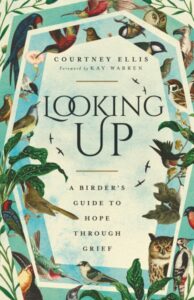 Looking Up: A Birder’s Guide to Hope Through Grief Courtney Ellis (IVP) $18.00 OUR SALE PRICE = $14.40 NOT YET RELEASED / PRE-ORDER – due very soon
Looking Up: A Birder’s Guide to Hope Through Grief Courtney Ellis (IVP) $18.00 OUR SALE PRICE = $14.40 NOT YET RELEASED / PRE-ORDER – due very soon
I have not seen this yet but we’ve heard that we will have it any day (even though the formal release date is in April.) We’re glad we will get to see it soon as it is going to be very special, getting some buzz, we hope, on social media. Ms Ellis is a gem of an author who we admire much. This book is, as the title clearly says, about processing grief through the curious hobby of bird-watching. Writing well about birding is a thing these days; we just got into the store the lovely hardback memoir by Trish O’Kane Birding to Change the World and, of course, there was the much discussed 2023 Better Living Through Birding: Notes from a Black Man in the Natural World by Christian Cooper of New York. We look forward to novelist Amy Tan’s Backyard Bird Chronicles coming the end of April.) But Courtney Ellis is, in our estimation, tag least, part of our tribe, a thoughtful, creation-loving, deeply spiritual Christian who knows that “kingfishers catch fire” as the Hopkins’ poem puts it. We invite you to pre-order it now, knowing we’ll have it any day, now and can send it early. Hooray.
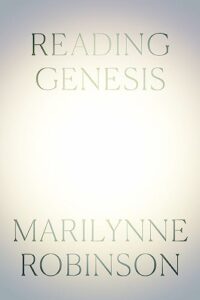 Reading Genesis Marilynne Robinson (Farrar, Straus, and Giroux) $29.99 OUR SALE PRICE = $23.99 NOT YET RELEASED / PRE-ORDER – releasing March 12, 2024
Reading Genesis Marilynne Robinson (Farrar, Straus, and Giroux) $29.99 OUR SALE PRICE = $23.99 NOT YET RELEASED / PRE-ORDER – releasing March 12, 2024
This is doubtlessly one of the more important literary releases of the year, the Pulitzer Prize winning novelist and exceedingly astute essayist — she has several collections of her award winning prose — exploring the epic, primal story of Genesis. Again, I have not seen a page of this yet but I can assure you without doubt that it will be taken seriously by thoughtful church folk and the watching world. National Humanities Medal winner Marilynne Robinson on Genesis? Who knows what she will notice and who knows what arguments she will make and who knows what delightful tangents she will take us on? This no doubt will be allusive and scientific and honorable and literary and most likely fairly dense, to be read slowly, I’m sure. Early reviews have called it “thrilling” and “radiant” and “a luminous interpretation” which “collapses the space between the holy and the mundane.”
We should have it to ship out by March 12th. Order now and we will add you to the waiting list. This is going to be exciting, especially for those who want a more fertile, imaginative way to approach these classic origin stories
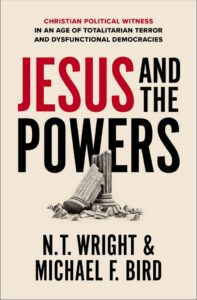 Jesus and the Powers: Christian Political Witness in an Age of Totalitarian Terror and Dysfunctional Democracies N.T. Wright & Michael Bird (Zondervan Academic) $22.99 OUR SALE PRICE = $18.39 NOT YET RELEASED / PRE-ORDER – releasing March 26, 2024
Jesus and the Powers: Christian Political Witness in an Age of Totalitarian Terror and Dysfunctional Democracies N.T. Wright & Michael Bird (Zondervan Academic) $22.99 OUR SALE PRICE = $18.39 NOT YET RELEASED / PRE-ORDER – releasing March 26, 2024
I have been working on reading this, a bit at a time as time permits, and it is nothing short of brilliant. In amazingly clear insight, these two Biblical and theological superstars offer fabulously contextualized Biblical interpretation, drawing well on their understanding of the social and cultural forces that shaped the Biblical narrative and the posture of the earliest Christians. They offer an “in by not of” argument, calling us to be deeply involved in transformative ways, pushing back against the idols of the culture, without putting our heads in the sand (on one escapist hand) or so wedding ourselves to one or another party or movement that we fail to allow the gospel-itself to animate our civic perspectives and political agenda. That is, we dare not remove ourselves from the public squares but we cannot not so immerse ourselves in our desires to be engaged and of use for the common good that we sell out, accommodating ourselves to the principalities and powers around us.
What are the principalities and powers? This is one of the most reliable, Biblical studies of this, drawing on the likes of Walter Wink (but, oh, they missed the boat by not citing Marva Dawn and her famous, appreciative, critique of Wink.) This is political theology at its best, offering a Kingdom perspective that is saturated by the sorts of animating visions long promoted by Wright (and Bird.)
They do draw on a host of important thinkers, from James Skillen to Jamie Smith to Luke Bretherton to Vincent Bacote to Oliver and Jean O’Donovan. They cite young Kaitlyn Schiess and old Stanley Hauerwas; they draw on Brian Walsh and Sylvia Keesmaat and while they have lots of contemporary political illustrations (some from the UK as in one brilliant comparisons of the views of faith and politics expressed by two different Prime Ministers, and some from the US or other countries) it is not only a study of statecraft. We commend it to anyone interested in public life, civic affairs, the relationship of Christ and culture, and, yes, for those more specifically interested in politics and a distinctively Christian way to manage the forces of evil in our political day.
There will be a lot of challenges for sensible, faithful, Christian thinkers this upcoming election cycle and we will be suggesting other helpful titles. This will be on the top of the list, rooting us in the grand narrative of Scripture, in the resurrection power of Christ and His regime which is afoot and in the powerful Spirit which is, of course, making all things new. Don’t miss Jesus and the Powers, a wonderful, well-informed, exceptionally Biblical study that applies full-orbed Kingdom faith to the idols of the culture and the forces of disarray afoot in our lands.
As I read more I will be disappointed if they don’t grappled with some of the themes in the magisterial and important Political Dreams and Illusions by David Koyzis, or at least the broad overview of political /national idols by Tom’s cousin, Christopher Wright, called Here Are Your Gods: Faithful Discipleship in Idolatrous Times or even the very practical guide to thinking Christianly about legislation by the late Ron Sider (Just Politics.) Still, so far, I am very, very impressed. You will be, too. This is so, so needed and we are grateful that it is coming out. It would be our privelege to send you one. Pre-order it today so we can send it as soon as it arrives later in the month.
12 RECOMMENDED BRAND NEW ONES — ALL 20% OFF.
If you want us to hold any order until anything you perhaps pre-ordered arrives, do say so. We want to be sensible and stewardly, serving you wisely. Let us know how you prefer your shipments to be consolidated, or not. We’re not automated, so you have to tell us what you’d like. Thanks.
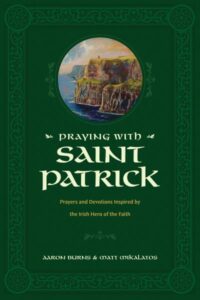 Praying with Saint Patrick: Prayers and Devotions Inspired by the Irish Hero of the Faith Aaron Burns & Matt Mikalatos (Tyndale) $18.99 OUR SALE PRICE = $15.19
Praying with Saint Patrick: Prayers and Devotions Inspired by the Irish Hero of the Faith Aaron Burns & Matt Mikalatos (Tyndale) $18.99 OUR SALE PRICE = $15.19
Take a look-see at this little book and say sure and begorrah or something like that. You don’t have to wear green, but this is a fabulous little (green) book in a genre of which there are dozens of fabulous little books. We’ve always carried a pretty wide selection of Celtic spirituality stuff — from large, formal prayers books to smaller booklets, biographies of Patrick and histories of his movement. Some Celtic spirituality is a bit overly pantheistic and nearly pagan while others are deeply, deeply Biblical and wisely theological. In any case, many are appreciating Celtic insights about God’s love for creation and the idea of ministry being attentive to local customs. One only needs to read How The Irish Saved Civilization to recall just how important the conversion of Patrick was and how dramatic his story is, as he escaped from slavery and returned to share the gospel with his old captors. For a simple but lovely children’s book, don’t miss Ned Bustard’s book that came out last year about this time, Saint Patrick the Forgiver: The History and Legends of Ireland’s Bishop.
And now we welcome this pair of upbeat authors who have given us a guide to learning to pray by drawing on the Celtic saint. From Saint Patrick we can learn to be drawn more deeply into “conversation with a God who cares deeply about you and your needs, concerns, and worries.” They continue, “Just as Patrick experienced God’s presence in the rugged wilds of Ireland, may you experience God’s presence in a powerful and vibrant way.”
There are prayers, here, for times of trouble and there are prayers for hope. They offer a prayer for freedom and one for when you feel like you don’t fit in. There is the ongoing invitation for Christ to draws near to us as we desire to be open to Him.
This is a fabulous little book because it offers short, reflective readings on the life of Saint Patrick and, on the facing page, a prayer. It is both an informative introduction to the Celtic way and on the life of Patrick, and a guide to using these ancient formulations of prayer in your own contemporary prayer life. Slaintѐ.
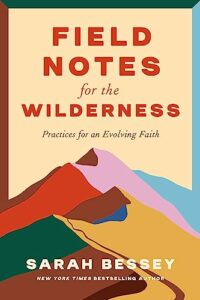 Field Notes for the Wilderness: Practices for an Evolving Faith Sarah Bessey (Convergent) $26.00 OUR SALE PRICE = $20.80
Field Notes for the Wilderness: Practices for an Evolving Faith Sarah Bessey (Convergent) $26.00 OUR SALE PRICE = $20.80
I have long appreciated the writing style and voice and vision of Sarah Bessey. She was “evolving” in faith decades ago — a wise sign when one is raised in a rather strict faith environment — and she offered those with ears to hear an alternative to what some now call radical deconstruction. She offered plenty of wise and witty critique of her charismatic and conservative evangelical subculture without dismissing the good news of the gospel (or, for that matter, the belief in the power of the Spirit and the possibilities of miracles, as she so movingly told in her excellent 2019 book, Miracles and Other Reasonable Things: A Story of Unlearning and Relearning God. That one in a way follows her first, the tender, honest, lively Out of Sorts: Making Peace with an Evolving Faith. (In between, by the way, she wrote the excellent Jesus Feminist, which we appreciated very much and continue to recommend for those who want a study that includes her own moving storytelling alongside Biblical exegesis.)
Anyway, this book opens with Sarah and her husband driving in the desert heat, leaving, we soon discover, a less than healthy experience at some Texas megachurch. (When she mentioned being tired of “fog machines and voter guides” I had to think for a second what she meant. If you know, you know.) She admits they were “limping home to Canada to reimagine our further, more than a little brokenhearted and burned out.” They pull over at a desert gas station and realize they are in the literal wilderness, an apt metaphor for the rough and barren nature of their spiritual location. And so the first chapter, written as a gracious letter, is “Welcome to the Wilderness.” It is poignant and a line made me laugh right out loud. If you like the writing of Sarah’s late friend, Rachel Held Evans or Rachel’s sister, Amanda Held Opelt or Jen Hatmaker or Cole Arthur Riley — who says this book shows us ways we might “survive together in the liminal” — you will appreciate this.
But, holy smokes, listen to this, from the exquisite writer, Barbara Brown Taylor:
I have had a lot of fathers in faith, but never a mother — at least until I met Sarah Bessey. Now she is the writer I recommend to anyone who needs to be seen, loved, and held before they can ever say why. Reading her new book is like opening a boxed lunch in the wilderness packed by someone who knew just what would get you through — along with a note that says, “Your soul is just fine.” The only difference is that this book keeps feeding you after you have finished the last page.
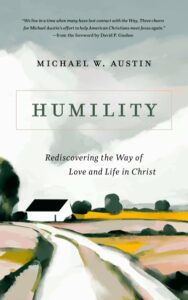 Humility: Rediscovering the Way of Love and Life in Christ Michael W. Austin (Eerdmans) $24.99 OUR SALE PRICE = $19.99
Humility: Rediscovering the Way of Love and Life in Christ Michael W. Austin (Eerdmans) $24.99 OUR SALE PRICE = $19.99
For many years, just about the only really good book we found to recommend on this much-needed virtue was the little classic (written in the late 1880s) by the old holiness preacher) Andrew Murray, Humility. Bethany House still has a handsome, small paperback that we like a lot. Just in the last two years there were two stellar volumes, a curious book influenced somewhat by Native American orientation by Richard Foster called Learning Humility and a recent one by the great Dennis Edwards, Humility Illuminated, nicely written with some insight included about multiethnic ministry. There are others, too, but these two newer ones now have a brand new one alongside them, by Michael Austin.
Austin is a philosophy professor, but don’t let that scare you away, as this is an approachable and fascinating study of the spiritual disciplines that can aid in the formation of this needed virtue. I took a real liking to Austin’s work years ago when he did a book about public life and social virtues for ordinary folks called Being Good: Christian Virtues for Everyday Life; that book was overtly Christian, yet invited even non-believes to values such as contentment, courage, love, compassion, wisdom, zeal, and more. There was a chapter in that book so many years ago on humility and I now recall that I liked it a lot. What a gift that Dr. Austin has resisted and expanded his work on this gentle theme in this new volume.
And he knows a bit about how this lives out for those of us wanting to speak well into our culture these days. He has edited a recent book of essays about QAnon and conspiracy theories and he has an excellent, powerful book on the debate about gun violence. He knows a bit about this dance of speaking out and doing so with a degree of humility and respect for others. Amid culture wars and church divisions, even, this trait of following Jesus in grace and love, is more vital (and more complicated) than ever before. Our union with God, he notes, can transform our very souls as they live out Kingdom ways in all corners of society.
Austin has been called one of the “leading voices about character and virtue today” and this little book has been called “profound.” One reviewer, an activist in public reforms, said it is “about eternal things while very much in the present.” Exactly.
A good forward is written by David Gushee who writes:
We live in a time when many have lost contact with The Way. Three cheers for Michael Austin’s efforts to help American Christians meet Jesus again.
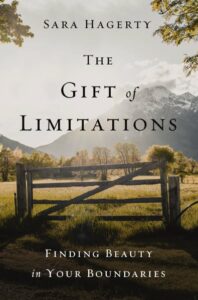 The Gift of Limitations: Finding Beauty in Your Boundaries Sara Hagerty (Zondervan) $26.99 OUR SALE PRICE = $21.59
The Gift of Limitations: Finding Beauty in Your Boundaries Sara Hagerty (Zondervan) $26.99 OUR SALE PRICE = $21.59
If you like the breezy, chatty, clever prose of Sarah Bessey et al, you will also appreciate the uniquely female voice of Sara Hagerty. She, too, seems informal and yet is profound; a thoughtful, sharp thinker who brings her insight by way of storytelling and memoir. From Anne Lamonte to Brene Brown to Shauna Niequist, this enjoyable, conversational style is common and popular.
But here’s the thing, what we know from Hagerty’s previous books (like the excellent Every Bitter Thing Is Sweet: Tasting the Goodness of God in All Things to Unseen; The Gift of Being Hidden in a World that Loves to Be Noticed) and a careful study of her footnotes and pull quotes in this brand new book: she draws on the very best of mainstream evangelical thinkers, not the deconstructing or edgy sort of iconoclasts. She cites RC Sproul and Tim Keller, Saint Augustine and a great interview with artist Mako Fujimura (conducted by the sharp and always interesting literary figure Philip Yancey.) Lots of authors routinely offer a nearly obligatory C.S Lewis quote, but she pulls from his lesser known works (the book opens with an epigram from The Problem of Pain, which caught my attention, since most authors don’t go there right away!) She seems to have an affinity for Lewis’s hero, George MacDonald. In a chapter called “A Better Way”, she cites a famous Hasidic tale (drawn, in this case, from a piece by Sylvia Rothschild.)
We all have limits — it is the very nature of our creatureliness (and on this, it is hard to beat the major work by Kelly Kapic called You’re Only Human: How Your Limits Reflect God’s Design and Why That’s Good News.) But this moving exploration moves towards those who need to savor God’s goodness in their limitations, even if they come from chronic illness or emotional trauma or too many bills or other hardships. She wisely quotes Edmund Clowney who quipped that “suffering is not the opposite of blessing.” As the flyleaf shouts, “God can use what limits us to bring us our greatest fulfillment.”
Do you feel overwhelmed, with a sense that there is just “too much.” I do. Maybe this sense of feeling deprived, the fear of missing out, a under-the-hood grumpy feeling of being limited is what we need transformed by a better view of “the boundaries of our circumstances.” She’s got a poetic voice, and offers Biblical texts at the end of each chapter pointing us to God’s insight on living within our limitations. This is hard-won wisdom, I gather, and I, for one, am going to carve out time with it.
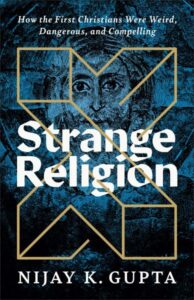 Strange Religion: How the First Christians Were Weird, Dangerous, and Compelling Nijay K. Gupta (Brazos Press) $18.99 OUR SALE PRICE = $15.19
Strange Religion: How the First Christians Were Weird, Dangerous, and Compelling Nijay K. Gupta (Brazos Press) $18.99 OUR SALE PRICE = $15.19
Gupta has been a rising star in New Testament studies lately, and is a professor of Northern Seminary. He’s got a PhD fro Durham University and is a popular blogger and hosts a podcast (and founded the Crux Sola blog) He’s written a bunch of commentaries (most recently, one I’m studying now, on Galatians) and has gotten some very respectful kudos for his 2023 IVP Academic book, Tell Her Story: How Women Led, Taught, and Ministered in the Early Church.) I loved what I dipped into in 15 New Testament Words of Life. He knows his stuff.
This new one is sort of funny, actually — you know his cool attitude and witty style if you follow him on his socials — and makes this a stand-apart study of the early church. As it says bluntly on the back, “The first Christians were weird”. Uh-huh. And maybe we need to be as well, known not for sucking up to power and flaunting our wealth, but for, well, like the first Christians “the oddness of their beliefs and practices.” As Gupta notes, “they believed unusual things, worshiped God in strange ways, and practiced a whole new way of doing religion that would have been viewed as bizarre and dangerous compared to other religions of the ancient world”
As the good professor traces the emerging Christian faith in its Roman context, he asks how such an upside-down and radical religion could also be seen as attractive and compelling. It’s a good question.
I’ve waited a while for this, and now that I’ve perused it just a bit, I realize I’ve been waiting for decades for such a winsome, practical, guide to the captivating world of the first centuries of church history. As Michael Bird notes in his rave review, Christians were once loathed for practicing a rogue religion” Maybe we, too, if we come to understand the social and historical context of the world in which the New Testament came to be written and compiled, will more seriously consider what it means to be nonaligned with the values of our culture. I’m sure it is going to be a blast to read, too. As Preston Sprinkle puts it, “it makes me excited to be a Christian.”
Remember the small, pocket sized book that we often recommend called Keep Christianity Weird: Embracing the Discipline of Being Different by the great missional thinker, Michael Frost? This new work, Strange Religion, by Dr. Nijay Gupta, with all its primary source quotes from Greco-Roman writers and those who study that era, gives the scholarly foundation for why Frost’s playful charge is not only hipster cool, but theologically necessary. That Gupta is as fun as Frost is a bonus. Get this book and be strange!
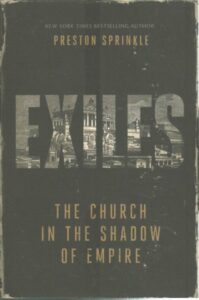 Exiles: The Church in the Shadow of Empire Preston Sprinkle (David C. Cook) $19.99 OUR SALE PRICE = $15.99
Exiles: The Church in the Shadow of Empire Preston Sprinkle (David C. Cook) $19.99 OUR SALE PRICE = $15.99
There has been a lot of discussion — in books, sermons, colloquia, confabs, in the scholarly meetings and on the streets, literally, at social service initiatives, civic meetings, and protests — about how the reality of empire has influenced the Biblical material and how that might effect our own relationship to the principalities and powers that be. From the grand resistance movement of Moses liberating God’s people from the brick-making quotas and repression of Pharaoh to the seminal influence of story later in the Hebrew Scriptures about exile and captivity in Babylon, and that second exodus back to a demolished homeland, Bible guys like Walter Brueggemann have helped us navigate this reality that liberation from captivity is a key aspect in the story of God. Other authors have helped us see that the earliest Christians, also, if maybe a bit less obviously, had this political overlay about Herod and Caesar and the “powers” noting vividly in Paul’s letters, but (once your trained to see it) in Matthew, Mark Luke and John. From Binding the Strong Man (a thick, seminal political study of Mark) to the work of Richard Horsley to the must-read Sylvia Keesmaat & Brian Walsh book Disarming Romans: Doing Justice/Resisting Empire there has been a mighty wind blowing through New Testament studies and to not grapple with it seems to be willful ignorance. Even the most judicious of conservative interpreters tell us that context matters and that Scripture interprets Scripture. To miss this study of empire and its socio-political implications is to disregard the truth of God’s Holy Word.
Enter the evangelical — and, in most areas, a fairly traditional one — preacher and popular thinker, Preston Sprinkle. Although the back of this brand new book asks “How Should a Christian View Politics?”, Exiles is less directly about citizenship or Christian views of statecraft and rather a study of what it means that our loyalty is to King Jesus and his global Kingdom.
“The first century church would never have mounted a Roman flag next to a Christian one, nor would they have let the politics of Rome destroy their blood-bought unity in Christ. Instead,” Sprinkle continues, “the church was a gathering of radicals who chose persecution — unto death — rather than compromise their identity as exiles.”
Here, the back cover explains, Preston explores why Israel’s exile to Babylon profoundly shaped the people’s political identity; why Christian should see themselves as foreigners in the country where they live; why the gospel of Jesus’s Kingdom was politically subversive, and how the church’s identity should be fundamentally spare from the empire, which too often demands total allegiances.
I’ve skimmed through this and studied the footnotes and see where he is going. I assume much of the impetus is to critique the way MAGA politics have infiltrated and sometimes consumed some Christian leaders. It is not only an anti-Trumpian warning, though, as it is more generally about “a more Biblical and powerful way to live in a secular world” — as exiles.
I’m impressed with Preston’s willingness to engage those with whom he disagrees (as in his efforts to generate discussion and dialogue around sexuality and gender issues, where he is doubtlessly kind but conventional.) If you think this is a bit much, you’ll find it hard-hitting, but gracious and careful.
The blurbs inside this, commending it to thoughtful readers wanting a solidly Biblical frame to our civic lives, are vivid and diverse. And actually, pretty spectacular, so if you trust wise authors, yoiu should listen. We have here rave reviews from Michael Gorman (who calls it “the most exciting book of biblical theology I have read in a long time”) and Brenna Blain (“Exiles provides a great depth and breadth of biblical wisdom…”) and Brian Zahnd and Michael Bird and more. Wow.
As Patrick Miller (of Truth Over Tribe) puts it in a longer comment:
The Left and the Right don’t just want your vote; they want your soul. So it’s no surprise that, in the absence of an alternative political vision, many Christians are hitching their theological wagons to secular political programs. In Exiles, Preston Sprinkle shows that Jesus offers a better way.
 Aslan’s Breath: Seeing the Holy Spirit in Narnia Matthew Dickerson (Square Halo Books) $19.99 OUR SALE PRICE = $15.99
Aslan’s Breath: Seeing the Holy Spirit in Narnia Matthew Dickerson (Square Halo Books) $19.99 OUR SALE PRICE = $15.99
This is a splendid new book, short and sweet, nearly brilliant in both the concept and the actual content. It’s a page turner for anyone interested in Narnia and — I hope — that would be many BookNotes readers. It is handsomely produced with some nice linocuts by Ned Bustard (one of the managing editors of Square Halo Books) and we love to promote their exceptional books. As a boutique publisher that does a lot of arts and literature-related titles, this fits well into their increasing collection of backlist titles. We are happy to have them all, and this new one reminds me of just how good and rare Square Halo stuff is.
Dickerson, you may know, teaches at Middlebury College in Vermont (alongside the better-known environmental writer Bill McKibben and the wonderful emeritus writer John Elder.) Matthew, too, has written wisely about nature, having penned books on fishing and the appreciation of rivers and streams. He has a major work on ecological themes in Tolkien (Ents, Elves, and Eriador: The Environmental Vision of J.R.R. Tolkien) and another on ecological themes in Narnia (Narnia and the Fields of Arbol: The Environmental Vision of C. S. Lewis — it is a must-read for Lewis and Narnia fans!) He even has an under-appreciated book on disciple-making in our idolatrous culture where we tend to strive after money, success, power, and the like: how do we mentor others into ways of solid faith formation given our cultural context? Anyway, he is an author I admire very, very much.
As you might tell from the allusive title of this brand new one, and certainly from the very clear subtitle, this is an almost one-of-a-kind contribution to the vast field of Lewis studies. We’ve got bunches of sharp Narnia studies and there are so many good books about Lewis that one could hardly imagine the need for much more. But when I heard that SHB was releasing this one from Dickerson, I rejoiced. There was one older book on this topic which covers other stuff as well, so ends up being lesser known, anyway. As far as I know this is the only viable, concise, clear-headed book on how the Holy Spirit appears in the Chronicles, and it is vivid, interesting, inspiring. I think it is fair to say there is nothing like it in print, a phrase I don’t get to say very often. Hooray.
Here are the primary titles from the table of contents:
- The Lion the Witch and the Wardrobe: Transforming Power
- Prince Caspian: Growing Bigger
- The Voyage of the Dawn Treader: Blended Symbols and More Courage
- The Silver Charm: Carried on Aslan’s Breath
- The Horse and His Boy: Gentleness and Comfort
- The Magician’s Nephew: Breath and Wind at Creation
- The Last Battle: Beyond Aslan’s Breath, More Pointers to the Holy Spirit
I hope you buy one or more of these from us, and then, if you are so moved, that you will go to your own nearest bookstore and invite them to stock it. Call your church library and you public library, too. This book should be widely known and readily available and at this point, my fear is that it is not. We’ve got it, though, so help us spread the word! As I have said, there is nothing like it, and it is very well done. This is one not to miss! Further up and further in!
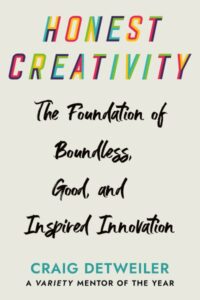 Honest Creativity: The Foundation of Boundless, Good and Inspired Innovation Craig Detweiler (Morehouse Publishing) $29.95 OUR SALE PRICE = $23.96
Honest Creativity: The Foundation of Boundless, Good and Inspired Innovation Craig Detweiler (Morehouse Publishing) $29.95 OUR SALE PRICE = $23.96
This, too, just arrived, and in our post-Jubilee conference recovery — with boxes of books stacked everywhere and piles of paperwork — I haven’t had time to study the new books that have poured in within the last two weeks. I’ve had this on my list for a while and I’m so grateful that it has now arrived and that we can highlight it for you.
For starters, there is a great blurb of endorsement by Makoto Fujimura, the abstract artist and author of several excellent books about the visual arts, about literature, and about “culture care”, as he puts it. Here, Mako says that “as an author and sojourner, I am thrilled and encouraged by Honest Creativity,” which he calls “a marvel of wisdom and scholarship.” Okay, then.
Whether you are a young creative and an artist or a more mature church or executive leader, who doesn’t need a solid exploration of the art of innovation and the transformative power of authentic creativity? Especially in this era of AI which is now upon us.
I have written often in BookNotes about the creative process, and more about Biblically-directed traditions of scholarship that help us think faithfully about aesthetics and the process of art-making. And, yes, we’ve written a bit about books that are less about the arts, as such, but about the process of being innovators in leadership, business, culture, and the church.
(Two, by the way, come to mind, perhaps to put into conversation with the ever-thoughtful Detweiler: you may recall my delight in discovering an academic study released by the University of Chicago Press called The Cult of Creativity: A Surprisingly Recent History authored — creatively and with verve — by Samuel Franklin, who explores the fascinating history of the newfangled term “creativity” as it was nurtured in business circles in the middle of the 20th century; and, you should know the scholarly, potent, critique of notions of ever-new innovation pitched as the answer for ineffective church ministry offered by Andrew Root in his breathtaking study, released in 2022, called The Church After Innovation.)
One can be aware of the often freighted assumptions carried by those who promote innovation and creativity and one can agree with Root that too much hope in too many spiffy formulas promising upbeat change in the local church are unhelpful, without dismissing the very notion that we are made in the image of a creator God and therefore have some natural inclination and charge to be creative. We do need to explore human creativity. As it says on the back of Honest Creativity, it will inspire innovation and give the practical tools to do so with “meaning, intention, and courage.”
Can we, as Detweiler puts it, “honor life” through honest artistic expression? Can, in fact, human ingenuity triumph over AI?
Ahh, and that becomes the rub of this book, this call to “honest” creativity. This is a study of creativity against the backdrop of the revolution being created by artificial intelligence.
Ralph Winter — head of creative at Sphere and producer of several Hollywood action films (from Planet of the Apes to X-Men) — says that Craig here “gives us the moral compass and counters to navigate the world of AI and machine learning. How we embrace or create with machines and what true and beautiful stories we will tell are the burning issues.”
Detweiler knows the latest stuff from his corner of the creative world — Rick Rubin on creativity, obviously, the new book by Jeff Tweedy, the wonder of insights from the black choreographer Twila Tharp, the astute conversations with Nick Cave. No book drawing on contemporary art and pop culture would be trustworthy, in my view, if it didn’t speak to the power of the documentary, Summer of Soul, and he does. It is so up-to-date that it notes the AI partnership with the Beatles in the recent release of “Now and Then.” He cites the famous TED talk by Sir Ken Robinson and the research of Mihaly Csikszentmihalyi. But he has also drunk deeply from thoughtful Christian authors — think Madeleine L’Engle, for instance, or Anne Lamott’s Bird by Bird.
Whether you worry about ChatGPT or not, this book looks like it is going to be one of the best studies of the year. Craig formerly taught at Fuller (in their film institute) and at Pepperdine, but is now the Dean of the College of Arts and Media and Grand Canyon University. Importantly, he also serves as the President and CEO of Wedgwood Circle, a philanthropic investment collective funding “creative projects of meaning.” Kudos to Church Publishing and their revived imprint Morehouse (despite the cheesy font in the subtitle) for releasing this timely, important work.
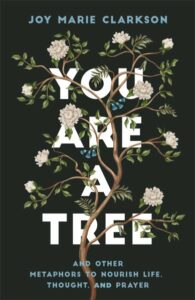 You Are A Tree And Other Metaphors to Nourish Life, Thought, and Prayer Joy Marie Clarkson (Bethany House) $17.99 OUR SALE PRICE = $14.39
You Are A Tree And Other Metaphors to Nourish Life, Thought, and Prayer Joy Marie Clarkson (Bethany House) $17.99 OUR SALE PRICE = $14.39
Oh my, another book that we pre-ordered months ago and which arrived just the other day. I’m so excited to see this as we stock all the books by the Clarkson tribe. (There are the good, older books by the mother, several books by the daughters, including Sally, and by a son, Nathan. These siblings — enter Joy Marie — have had extraordinary output in recent years and they are eloquent, smart, and terrific authors to know and read.
Sally, so you know, is the author of Aggressively Happy and host of the Speaking with Joy podcast. She is a research associate in theology and literature at King’s College in London and the books editor for Plough. She holds a PhD in theology from the University of St. Andrews.
Have you ever heard anyone describe themselves as a tree?
She notes,
When we’re thriving, we speak of being rooted and fruitful, in a good season. When we struggle, we might describe ourselves as withering, cut off from friendship and the world. These ways of describing ourselves matter because they shape the ways we live.
But she also warns that:
…in a world dominated by efficiency, we have begun to use more unforgiving metaphors. We speak of ourselves as computers: we process things, we recharge. In doing so, we come to expect of ourselves an exhausting, relentless productivity.
Wow. As a scholar and exceptionally thoughtful writer, this could have been parlayed into an academic book at a scholarly publishing house but it is written for ordinary folks, for book clubs, and Sunday school classes, for you and me as we try to ponder the metaphors we use and how they shape our assumptions about the human person.
We should pay attention to this and You Are A Tree will help. We can listen to our experiences and to the words we use to describe those experiences. Fascinating, eh?
This is an important bit of social commentary and cultural analysis, but it is, to be honest, mostly a collection of meditations, of poetic and reflective studies of things like wisdom, security, love, change, and sadness. In each of 7 chapters she starts with a declaration with the word (not) interspersed — “Safety is (not) a Fortress” or “Life is (not) a Journey.” This looks really interesting, contrasting popular wisdom with more ancient, Biblical images.
Poet Malcolm Guite, who knows a thing or two about metaphor, calls it “delicious.”
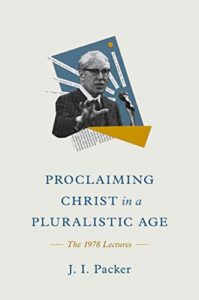 Proclaiming Christ in a Pluralistic Age — the 1978 Lectures J. I. Packer (Crossway) $24.99 OUR SALE PRICE = $19.99
Proclaiming Christ in a Pluralistic Age — the 1978 Lectures J. I. Packer (Crossway) $24.99 OUR SALE PRICE = $19.99
I hope I do not have to say who J.I. Packer was or how important he was as a gracious, theological leader from the evangelical and Reformed wing of the Church of England, and the influence he had over generations of American evangelicals. I still come back to chapter three of Knowing God from time to time, moved in my soul about the character of God and the importance of authentic intimacy with God.
He was gracious and witty, but a classic, older-school preacher, a bit staid, intellectual, deeper than your average public speaker. (Yet, he was whimsical at times, and so un-ironically British — he once called some friends of ours who had a book at the time called All of Life Redeemed, the Fab-Four of Pittsburgh. And he did a powerful critique of materialism and cultural conformity within the growing evangelical movement in the states which he called “Hot Tub Religion.”)
In the very late 1970s he gave a series of talks in several places. He did four keynote addresses in Pittsburgh at our then-new Jubilee Conference. These lectures eventually gave rise to some fairly prestigious addresses that became vintage Packer — what one remembers as “calm and courteous style with an unrelenting focus on the Lord Jesus as our Savior.” Perhaps the most famous place these lectures were given was at Moore Theological College in Australia (and then, again, at what is now Kuyper College in Grand Rapids, Michigan.)
This handsome little hardback is a labor of love, carefully transcribed from the recordings of those events. They include five lectures, each meticulously crafted, with orthodox Biblical truths carefully contrasted with other philosophies and renderings that were popular then, from a secularized humanism to a new age universalism. These are among the issues we continue to face in our time and these lectures — agree fully or not with his articulate positions — are surely some of the most potent and robust answers provided. Here are the chapter titles comprising this 130-some page book.
- We’ve a Story to Tell: We Preach Christ Crucified
- The Man Christ Jesus: The Humanity of Jesus Christ
- He Emptied Himself: The Divinity of Jesus Christ
- A Wonderful Exchange: The Work of Jesus Christ
- No Other Name: The Uniqueness of Jesus Christ
 Solo Planet: How Singles Help the Church Recover Our Calling Anna Broadway (NavPress) $17.99 OUR SALE PRICE = $14.39
Solo Planet: How Singles Help the Church Recover Our Calling Anna Broadway (NavPress) $17.99 OUR SALE PRICE = $14.39
If we had more time and space I’d love to talk about this book in much more detail. (And the topic — there are a few very good books on the subject amid some that are less important.) There is so much packed into this charming bit of story and research that it could almost be two or three books. I’ll admit, there were times when I wondered why the editor didn’t reign the author in a bit. And yet, I really loved its meandering style, its admixture of adventure and travelogue and testimony, its discussion of methodology and data, its thoughtful theological framing and its amazing global nature.
Let’s start with that: Anna Broadway, who wrote a thoughtful work a few years back called Sexless in the City, wanted to draw into a conversation about singleness the actual voices of single folks. As a nearly middle-aged woman, she also knows that many Christian books on this topic (including some I might rule out as overly cheesy or wrong-headed) are aimed at younger, straight, able-bodied, evangelical women. She wanted to hear from men and women within the wider body of Christ and so she bravely set out to interview single people of various ages and of all sorts of faith traditions from all over the world. Wowie-zowie — I had no idea. This captivating book covers all that and more!
The words of those she met — translated from interviews in Russia and Africa and Latin America and Australia and more — give the book an exceptional quality, poignant and real. (Some of the remarks she reports are not eloquent or profound, really, which gives the book a very authentic feel, drawing me in, knowing that these folks were fairly ordinary believers of various sorts and ages with joys and pains that are in some cases pretty universal.) She interviewed older men and women, of various races and ethnicities, and some individuals who have various disabilities. Orthodox, Catholic, and various kinds of Protestants show up and she tells the stories of how she came to meet them, some which make for truly riveting reading. There are even vignettes interspersed throughout that are delightful travelogue pieces, sharing her sometimes zany efforts to get passports or find housing or work with translators, even as she travelled the globe at her own expense, by herself, occasionally with some degree of danger. What a story!
Not only does Anna Broadway interview single folks from all over the world about their experience of being a Christian who is not currently married, she invites conversations about all manner of Christian living, from leisure and rest to work and career, from health care and housing to vacations and finances, and obviously sex and gender. That is, her robust understanding of whole-life discipleship compelled her to not merely ask theological or church-related questions about the desire (or not) to be married, but she evoked reflections on the life of faith lived out in all manner of settings and in various stages of life. Expanding the voices of singleness to include older Catholic widows or young wheel-chair bound evangelicals or divorced Protestants reminds us of the many ways there are to live out faith in community and, also, importantly, that everyone is single at some time in their life. Right? There should be much more intentional sensitivity to this in our spiritual communities but she find, well, you know. It’s hard.
Broadway notes in the beginning of Planet Solo that she sort of assumed (and maybe had heard) that in some other (non-Western) cultures that were less driven or materialistic or individualistic than ours, singles might be better integrated into extended families and church fellowships and small groups, but this was decidedly not the case (and, in some cultures, anti-single sentiment might have been more blunt and burdensome.) In any case, she does tell of how unmarried folks are or are not involved in the broad life of Christian community in various congregations and parishes, from Alaska to Germany, from the Middle East to the Far East, from urbane Manhattan to the deep American Southland.
Kudos, too, to Ms Broadway, as she took as mentors leading into the project the guidance and input of people of color, most notably evangelical leaders such as Soon Chan Rah and Kathy Khang and Michael Emerson, among others. She tells of meeting two indigenous, Native leaders to learn more about First Nation cultures and ways to have good conversations without causing cross-cultural hurt. Her growing sensitivity to matters of race and class and caste within even the church gives her an almost prophetic edge in calling the church to become a better version of authentic Christian community. She is never heavy-handed and she moves from topic to topic with delightfully little effort, but her call to the church to be more inclusive is a clarion call.
(Note: I wonder if the last phrase of the subtitle might be misconstrued. The “calling” to be recovered is not the callings of single folks, I don’t think, but the calling of the church to be the inclusive, intentional community it is meant to be. The question on the back cover is clear: “How can the church do better for its millions of singles?”)
I had little idea just how much of a gender gap there is in global Christianity; as in the US, there are millions and millions of more women in churches than men. The sometimes unspoken (and sometimes bluntly spoken) call for women to trust that God will have them get married [to a Christian partner] is increasingly unlikely, and the need to think theologically about greater integration of unmarried folks into the life of the local congregation is as pressing as ever. What might family look like if we reject the sociology of the nuclear family and understand our being siblings in Christ as a first family? These are urgent questions, pleasantly and gently raised in this fabulous survey.
Solo Planet is not alarmist or bitter, even though, frankly, reading some of the narratives of some of the interviews, the mistreatment of single folks is common enough that it is surprising how many stay connected to the institutional church. Alas, data seems to show, if I read Broadway correctly, that more unmarried people are leaving the church more rapidly than married people. So, in a way, this is a crisis, and it is only going to get worse. It is a social reality that church folks and leaders, especially, are going to have to address with greater creativity and grace and understanding, sooner rather than later.
In Anna’s travels she learned a lot, much of which she narrates in an off-the-cuff sort of style. She is a professional journalist and fine writer but this is not intended to be an eloquently luminous essay or academic sociological study, but more of a field guide, a report, a telling of a story, a story which tells the stories of many brothers and sisters from across the denominational divides and across cultures, ages, races, and nationalities. From chapters on food and eating together to chapters on how sexual minorities are treated to a good chapter on housing — “How Shelter Shapes our Character” — there is so much to consider. Reading this is an eye-opening adventure, a compelling, fun read. I very highly recommend it.
By the way, there are discussion questions in the back making this ideal for a church forum or discussion study or book club selection. Use it — especially if the group includes marrieds and non-marrieds, widows and young singles, etc. Throughout the book she offers some things to ponder and pray about, too, making this personally engaging, even as she offers some very big picture questions for the churches and for all of us. Fascinating.
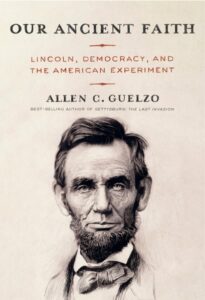 Our Ancient Faith: Lincoln, Democracy, and the American Experiment Allen C. Guelzo (Knopf) $30.00 OUR SALE PRICE = $24.00
Our Ancient Faith: Lincoln, Democracy, and the American Experiment Allen C. Guelzo (Knopf) $30.00 OUR SALE PRICE = $24.00
This is the latest from the important historian (and Christian scholar), Allen Guelzo. He has won the prestigious Lincoln Award three times (!) and has been awarded the rare Guggenheim-Lehrman Prize for Military History. We have stocked most of his books which are almost uniformly seen as astute, wise, informative, and morally serious. He is currently a Senior Research Scholar at the Council of Humanities at Princeton University. The new book, like his others, are beloved already.
It is altogether fitting and proper that, with this meditation on democracy and its most subtle defender, Allen Guelzo again demonstrates that he is today’s most profound interpreter of this nation’s history and significance. — George F. Will
I’m not even going to try to explain the value of this important new work, but I’ll copy what the publisher has said. I hope it is helpful — it sure seems inspiring to me!
They write:
An intimate study of Abraham Lincoln’s powerful vision of democracy, which guided him through the Civil War and is still relevant today–by a best-selling historian and three-time winner of the Lincoln Prize
Abraham Lincoln grappled with the greatest crisis of democracy that has ever confronted the United States. While many books have been written about his temperament, judgment, and steady hand in guiding the country through the Civil War, we know less about Lincoln’s penetrating ideas and beliefs about democracy, which were every bit as important as his character in sustaining him through the crisis.
Allen C. Guelzo, one of America’s foremost experts on Lincoln, captures the president’s firmly held belief that democracy was the greatest political achievement in human history. He shows how Lincoln’s deep commitment to the balance between majority and minority rule enabled him to stand firm against secession while also committing the Union to reconciliation rather than recrimination in the aftermath of war. In bringing his subject to life as a rigorous and visionary thinker, Guelzo assesses Lincoln’s actions on civil liberties and his views on race, and explains why his vision for the role of government would have made him a pivotal president even if there had been no Civil War. Our Ancient Faith gives us a deeper understanding of this endlessly fascinating man and shows how his ideas are still sharp and relevant more than 150 years later.
It is impossible to read Our Ancient Faith without feeling that Guelzo wrote this book as much for himself as for us, to fortify himself for the 2024 election battle to come; and to share an illuminating and ennobling story with a people short on hope and–just as important and just as troubling–perspective. — David Shirbman, The Boston Globe
+++
TO PLACE AN ORDER
PLEASE READ, THEN SCROLL DOWN AND CLICK ON THE “ORDER HERE” LINK BELOW.
It is helpful if you tell us how you want us to ship your orders.And if you are doing a pre-order, tell us if you want us to hold other books until the pre-order comes, or send some now, and others later… we’re eager to serve you in a way that you prefer. Let us know your hopes.
The weight and destination of your package varies but you can use this as a quick, general guide:
There are generally two kinds of US Mail options and, of course, UPS. If necessary, we can do overnight and other expedited methods, too. Just ask.
- United States Postal Service has the option called “Media Mail” which is cheapest but can be a little slower. For one typical book, usually, it’s $4.33; 2 lbs would be $5.07. This is the cheapest method available and seems not to be too delayed.
- United States Postal Service has another, quicker option called “Priority Mail” which is $8.70, if it fits in a flat-rate envelope. Many children’s books and some Bibles are oversized so that might take the next size up which is $9.50. “Priority Mail” gets much more attention than does “Media Mail” and is often just a few days to anywhere in the US.
- UPS Ground is reliable but varies by weight and distance and may take longer than USPS. Sometimes they are cheaper than Priority. We’re happy to figure out your options for you once we know what you want.
If you just want to say “cheapest” that is fine. If you are eager and don’t want the slowest method, do say so. It really helps us serve you well so let us know. Keep in mind the possibility of holiday supply chain issues and slower delivery… still, we’re excited to serve you.
BookNotes
SPECIAL
DISCOUNT
20% OFF
ALL BOOKS MENTIONED
+++
order here
this takes you to the secure Hearts & Minds order form page
just tell us what you want to order
inquire here
if you have questions or need more information
just ask us what you want to know
Hearts & Minds 234 East Main Street Dallastown PA 17313
read@heartsandmindsbooks.com
717-246-3333
Sadly, as of March 2024 we are still closed for in-store browsing. COVID is not fully over. Since few are reporting their illnesses anymore, it is tricky to know the reality but the best measurement is to check the waste water tables to see the amount of virus in the eco-system. It isn’t good. It is important to be aware of how risks we take might effect the public good — those at risk, while not dying from the virus, are experiencing long-term health consequences. (Just check the latest reports of the rise of heart attacks and diabetes among younger adults, caused by long Covid.) It is complicated, but we are still closed for in-store browsing due to our commitment to public health (and the safety of our family who live here, our staff, and customers.) Our store is a bit cramped without top-notch ventilation, so we are trying to be wise. Thanks very much for understanding.
We will keep you posted about our future plans… we are eager to reopen. Pray for us.
We are doing our curb-side and back yard customer service and can show any number of items to you if you call us from our back parking lot. It’s sort of fun, actually. We are eager to serve and grateful for your patience as we all work to mitigate the pandemic. We are very happy to help, so if you are in the area, do stop by. We love to see friends and customers.
We are happy to ship books anywhere.
We are here 10:00 – 6:00 EST / Monday – Saturday. Closed on Sunday.

